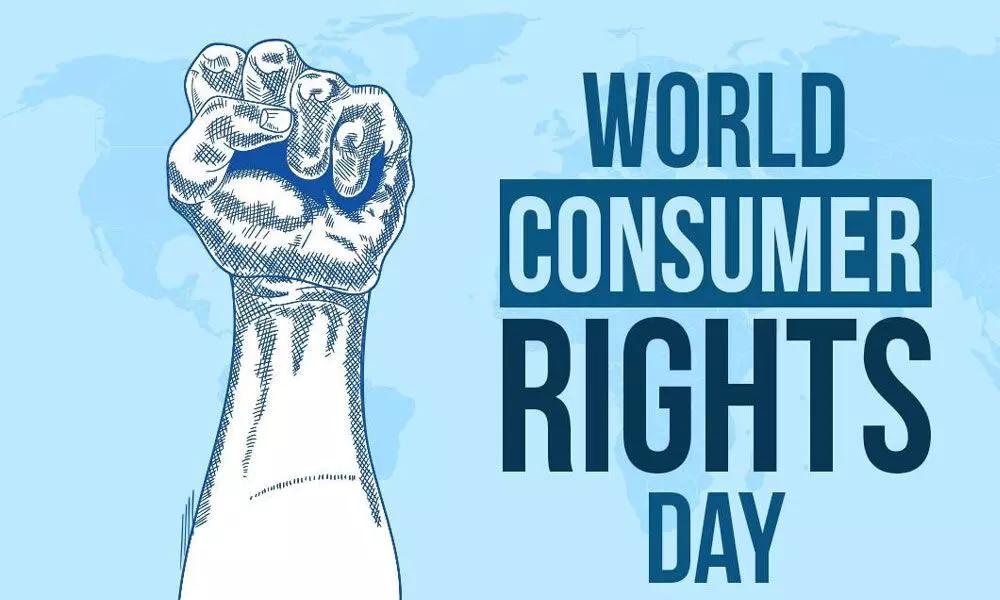The myth of consumer sovereignty in India

World Consumer Rights Day
The World Consumer Rights Day (WCRD) is a day which is celebrated on March 15 every year across the world to debate on a specific theme of world importance and to promote consumer rights and awareness among consumers
The World Consumer Rights Day (WCRD) is a day which is celebrated on March 15 every year across the world to debate on a specific theme of world importance and to promote consumer rights and awareness among consumers. The Consumer International (CI), a non-profit London-based consumer organization is organizing World Consumer Rights Day on March 15, of every year since 1983.
The consumer movement marks March 15th of every year, recognizing promulgation of consumer rights by the then President of USA John F. Kennedy, while addressing US congress on 15th March 1962. Since then world consumer rights day is being organized with a special focus on a specific theme like Fix Our Phone Rights (2014), Healthy Diets (2015), Antibiotics Off the Menu (2016), Better Digital World (2017), Making Digital Marketplaces Fairer (2018), Trusted Smart Products (2019) and The Sustainable Consumer (2020) apart from promoting consumer rights across the world. The theme for World Consumer Rights Day on March 15, 2021, is "Tackling Plastic Pollution".
All the consumer organisations around the world are joining together to call for global changes to avert environmental breakdown in the current World Consumer Rights Day (15 March 2021). It is a dire need of the day to resolve the global crises of climate change and loss of biodiversity. The decade of 2020 is the last chance to limit global warming to 1.5c since pre-industrial times, in line with the Paris Agreement, and to reverse the current trend of wide-scale biodiversity loss.
The consumer movement will highlight the lifestyle changes of the consumers, and what they can make to play their role, and what governments and businesses need to do to make sustainability the easy choice for consumers. Millions of consumers are already feeling the effects of climate change throughout the world. To protect the planet and provide fair social conditions for present and future generations, serious attention is needed on the way we produce and consume goods and services. One of the root causes for all these changes is excessive use of plastic and its pollution on the earth and ocean.
The production and consumption of plastics, mostly single-use plastic are not sustainable and it is impacting badly on our ecosystems, causing negative environmental threats at both local and international and human health impediments. It's considered as one of the major causes of the global climatic change and estimated that plastic could emit 56 billion tonnes of greenhouse gas emissions, accounting for 14 percent of the earth's remaining carbon budget by 2020. By 2100 it will emit around 260 billion tonnes, which indicates the seriousness of plastic pollution.
Since time immemorial, consumers have been the victim of exploitation. The consumers in India are in a most deplorable situation, where they are made to pay exorbitant prices for essential goods by the businessmen and middlemen, for whom profit-making is the sole aim without public welfare. The businessmen follow unethical business practices, taking the existing situation for their advantage and for making a profit at the cost of consumers. As a consequence, the consumers' interest is relegated to the backward in the complex industrial global economy.
Consumers do not get pure and qualitative goods in the market though every advertisement assure them of only purity and quality. Most of the goods in the market are either adulterated or inferior products. The consumers bear all these evils silently without protest, though the consumer has every right to protect himself against these malpractices. Even those few consumers who are aware of their rights as consumers tend to be cynical and do not complain or protest since the exploiter can always manage to protect himself against official action.
Even after 34 years of the CP Act 1986, and its amendments from time to time including CP Bill 2018 and CP Act 2019, there is no much headway in favour of consumers. In India widespread illiteracy, poverty, ignorance of consumer rights, lack of sufficient information about products and services, the lethargic attitude of the consumers, and lack of organized efforts to check the market evils are some of the major factors contributing to the plight of the consumers. Millions who are living below the poverty line are busy just keeping themselves alive. The mere struggle for survival uses up all their energies. They have neither the time nor the inclination to think of their rights and lodge protests against the deceivers. Even literate and educated consumers feel helpless before the might of the exploiters in the market milieu.
Legal framework for consumer protection
The government has made considerable efforts and enacted several meaningful legal measures to protect the consumers from the clutches of mischievous businessmen. India has enacted more than two dozen Acts to protect the consumer in various dimensions.
Consumer Protection Act, 1986
The Consumer Protection Act 1986 is a landmark in the history of the Indian legal framework which was enacted in 1986 for providing comprehensive solutions to the consumer problems in the Indian market milieu. It is the backbone of the Indian consumer movement. To resolve the consumer disputes this Act has made comprehensive provisions. Sec. 9 of the Act provides for three-tier redressal machinery viz., District Forum, State Commission, and National Commission. It provides certain rights to consumers and establishes a 3 tier quasi-judicial machinery at the district, state, and central level for the speedy redressal of consumer grievances. This act was modified from time to time by Act no.34 of 1991, Act no.50 of 1993, and Act no.62 of 2002 to serve better to consumers, followed by
Consumer Protection Bill 2015, Consumer Protection Bill, 2018, and Consumer Protection Act 2019 (CP Act 2019). The 'CP Act 2019' has gone one step forward in paving the way for identifying, recognizing, and incorporating various rights for consumer protection, which were necessary for a view of the changing circumstances of the business environment. It has not only empowered the consumers by incorporating various rights not previously available but has also imposed enough responsibilities on the stakeholders like dealers, manufacturers, service providers, and even on their endorsers.
The consumers and the government should take up the issue of tackling plastic pollution on a war footing and reduce its impact on climate change. The government should develop a strategy to use all this plastic waste for power generation. If all consumers, consumer organizations, business units, traders, and government are united by a common purpose and continue their activities in a spirit of fairness and commitment, certainly the menace of plastic pollution should be controlled. Let us hope for the best.
(The author is a Professor of Commerce (Retd) at Sri Venkateswara University)














